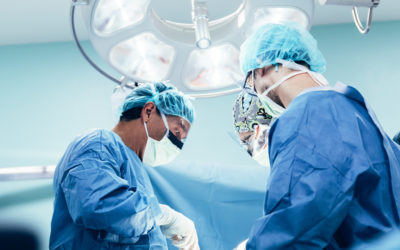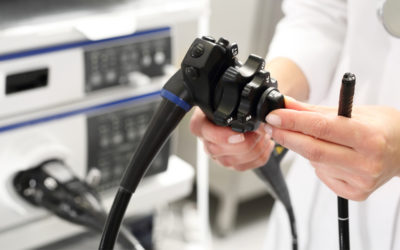Laparoscopic/Robotic Colectomy
Your colon is vital to your digestive health — so when a condition affects this vital organ, it can be disruptive to your life, and in some cases, life-threatening. While treatments like medication can often help relieve symptoms, sometimes surgery is the best option for your long-term wellness.
At McKenzie-Willamette Medical Center, the colorectal surgeon specializes in colectomy, a procedure to remove all or part of your colon. For many patients, especially those with chronic conditions, colectomy can make a significant difference in their quality of life.
McKenzie-Willamette Medical Center’s colorectal surgeon is trained in the most minimally invasive laparoscopic and robotic techniques, which may offer you significantly less pain, fewer complications, and a faster recovery.
Why Colectomy is Used
The colon is part of the body’s digestive system, which removes and processes nutrients from foods and helps pass waste from the body. Colectomy, also called bowel resection, is performed to treat and prevent conditions that impact the colon, such as:
- Bleeding that can’t be controlled. Severe bleeding from the colon (perhaps from a tear) may require surgery to remove the affected portion.
- Bowel obstruction. A blocked colon is an emergency that may require partial or total colectomy.
- Colon cancer. A small or more substantial section of the colon may be removed, depending on the stage of cancer.
- Crohn’s disease. If medication isn’t helping, removing the affected part of your colon can offer relief.
- Diverticulitis. Your doctor may recommend a colectomy if your diverticulitis recurs or causes complications.
- Ulcerative colitis. Your doctor may recommend total colectomy for severe symptoms that can’t be controlled by medication.
Preventive surgery
If multiple precancerous polyps are found during a colonoscopy, you may choose to undergo total colectomy to prevent cancer. Colectomy may also be an option if you have an inherited genetic condition that increases colon cancer risk, such as familial adenomatous polyposis (FAP) or Lynch syndrome.
Robotic Colectomy: Better Precision, Less Incision
Traditional “open” colectomy requires the surgeon to make an incision in your abdomen large enough to see the colon and perform the procedure using hand-held tools. Whenever possible, McKenzie-Willamette Medical Center colorectal surgeon uses a more minimally invasive approach — either laparoscopic or robotic-assisted with da Vinci® technology — which requires just a few small incisions.
During robotic surgery, your surgeon sits at a console next to you and operates using tiny, wristed instruments. The da Vinci system translates every hand movement in real-time to bend and rotate the devices with ultra-precision. A camera provides a high-definition, 3D magnified view inside your body.
These techniques often offer a variety of benefits, including:
- Less post-operative pain
- Less scarring
- Fewer complications
- Shorter hospital stay
- Quicker return to your life
As with any major surgery, there are potential risks, and not every patient is a candidate for minimally invasive surgery. Your colorectal surgeon will carefully discuss all options with you and help find the right procedure for your health and life.
Find a Specialist
Call 575-543-7200
Related Services and Conditions
Surgical Services
McKenzie-Willamette Medical Center offers general and specialized surgical procedures. Many of these procedures are available on a same-day, outpatient basis. Services include: Abdominal exploration Appendectomy Bladder repair Breast cancer Colon/bowel resection...
Colonoscopy
Colorectal Cancer Screening and Colonoscopy Prep Although colorectal cancer is one of the most common cancers in the United States, it often goes undetected, according to the American Cancer Society. Symptoms do not usually occur until the disease is advanced and 75%...
Gallbladder
Does everything you eat cause pain? If you suffer from pain in the upper right or upper middle part of your stomach after eating it could be your gallbladder causing the issue. The gallbladder is located under the liver, which stores and collects bile produced in the...
Head & Neck Surgery
When medication and other non-surgical treatments cannot relieve pain or symptoms in the head and neck, surgery may be the recommended treatment. For many years, traditional open surgery has been the standard approach to treating many head and neck conditions....
Hemorrhoids
You don’t have to sit still for hemorrhoids Did you know that by age 50, about half of people will experience hemorrhoids? If you’re one of them – and you’ve had enough of the burning, itching and pain – call us today. Treatment is available on an outpatient basis,...
Hernia
Hernias can be more than a pain in the side. If you experience a heavy feeling in your abdomen when you bend, pain when you lift heavy objects or a lump that enlarged when you strain and disappears when you lie down, it could be a hernia. Having it treated will not...
Laparoscopic/Robotic Proctectomy
If you’re diagnosed with colon or rectal cancer or have a chronic digestive condition like inflammatory bowel disease (Chron’s disease and ulcerative colitis), your doctor may recommend a proctectomy. This procedure removes all or part of the rectum, depending on your...
Outpatient Surgery Services
Some of the surgeries that we perform at McKenzie-Willamette Medical Center are outpatient services, meaning they don’t require a hospital stay. Patients come in, have surgery, recover for a few hours and then return home by the end of the day. Advanced technology...








